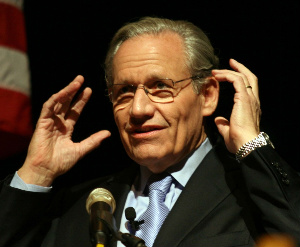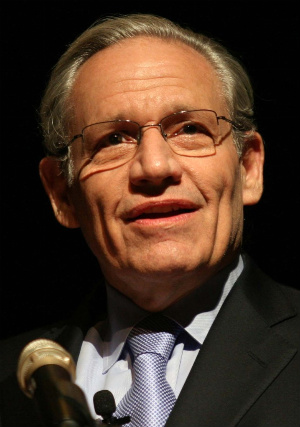
Speaking to a packed house of Tufts students, Robert Woodward delivered a masterful performance for the Richard E. Snyder President’s Lecture Series - Photo by Andrew Firestone
By Andrew Firestone
Robert Woodward took time this last Monday, April 25, to reflect on his long career as a journalist and writer. He recalled sitting in a Washington courtroom, waiting for the burglars to be arraigned.
“Five men walk in to be arraigned in business suits and they had hundred dollar bills in their pockets, not your average burglars,” he said. The judge asked the lead burglar before him, James McCord, ‘where did you work, McCord,” after hearing he was unemployed.
After whispering into the microphone, inaudibly, Woodward remembered McCord fearfully saying: “CIA.”
“In the movie and in the book and in reality, I go, ‘Holy S@#*’.”
While Woodward wouldn’t have believed the morning would lead to his elevation as one of the preeminent journalists of the day, he says that Google wouldn’t have helped him with uncovering the conspiracy, or finding his sources, or scouring his tapes. “You get good inside information from human beings, it’s not on the Internet.”
Speaking to a packed house of Tufts students, Woodward delivered a masterful performance for the Richard E. Snyder President’s Lecture Series at the Cohen auditorium. There, students discussed with Woodward his first-hand experience in uncovering truth, telling good stories, and being a part of the country’s fabric of democracy.
“What we should worry about the most is secret government,” said Woodward. “This concentration of power in government is breathtaking. It increases from administration to administration,”
“Whoever said it got it basically right: democracies die in governments,” said Woodward, adding that without a qualified estate of journalism “we’re finished.”
The lecture spanned Woodward’s entire career, from his early days working the Watergate scandal, on through to his recent book on Barack Obama. Discussing topics such as journalistic accountability, and the need to investigate closely public institutions, Woodward said that it was always necessary to understand what one was writing, and always take into account potential impact versus public good, rebuking the bombast website WikiLeaks for their practices.
He recalled his desire to publish accounts of a secret army in the Middle East in his new book, but found the NSA asking him to not print anything about it’s existence.
“On a Richter scale of zero to ten, what is [the potential damage]?” he asked them. “And they said, this is a nine, and made the case that people would be killed and it would really have a stunning negative impact on things the United States is doing,” he said, “and it’s not in the book.”
“I push for maximum disclosure,” he said, “but quite frankly I don’t want to write something in a book or a newspaper article that’s going to get someone killed.”
He said that he had been wrong at times. For example, when President Ford had pardoned Nixon after his resignation, Woodward was suspicious, and believed an underhanded deal had taken place. He was shocked when he asked Ford about a deal, he made an honest explanation for his actions.
“I did not pardon Nixon for Nixon or myself,” he recalled Ford saying. “I pardoned Nixon for our country.”
Ford explained that dragging out the trial for two or three more years would have morally bankrupted the office of the presidency and that “we had to get Nixon into history and move on.”
“I realized I had it wrong,” said Woodward, “that what he did was gutsy.” Woodward’s book influenced Ted Kennedy to give Ford an award in their “Profiles in Courage” award from the Kennedy family for political courage.
“For somebody in my business, how totally sobering, what a cold shower to think something is this way, and to subject it to neutral scrutiny and really excavate it, interview and re-interview and get documents and discover that it’s exactly the opposite,” said Woodward. “It puts you in the mode of not rushing to judgment,” a trope he found disturbingly absent in modern media.
He said that he took the practice of profiling presidents as a means to explore not only historical figures, but also their human character as well. In a recent interview with Obama, Woodward quizzed him about war for his new book “Obama’s Wars”. “War corrupts everybody, when you are in the business of killing, organized killing,” Obama said to him, “It leaves no heart unstained.”
“When you do one of these projects, particularly about a person, you are driving at the question, ‘who is Barack Obama, who is this man, really?’”
“I almost called the book “The Divided Man,” because there is this side of him that understands the horror and the nightmare and the hell of war and there is the side of him who understands he has to be commander-in-chief.”
Woodward also still had venom reserved for his old adversary, Nixon, who he believes will never be redeemed.
“Everything in the Nixon tapes, it’s always about Nixon. How do you use the presidency as an instrument of reward or punishment,” said Woodward. “The nightmare of the Nixon presidency is its smallness. It became disconnected from the basic function of the job.”
He said that while revisionists might try to paint Nixon as a fundamentally good man, the truth is that his reputation will not change. “The tapes are the tire iron around his neck and define him so much. That doesn’t mean he didn’t do some worthwhile things,” he said.
He maintains that his role in taking down the president, almost 37 years ago, was mostly due to a system that worked properly. “In the end, when there was so much evidence, and it was a mere fragment of what is available today. Barry Goldwater, the conservative Republican, went to Nixon and said ‘too many lies, too many crimes.’ It’s the Republican Party that turned Nixon out.”
He called the real tragedy the “secret government,” that grew corrupt on its own power.
“To my knowledge the dog that never barks on the Nixon tapes; no one ever says ‘what would be good for the country’.”














Reader Comments